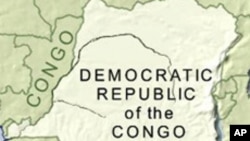Alan Doss told the Security Council on Wednesday that the objectives of the mission have largely been completed, but he acknowledged the price had been high.
The Congolese national army launched the operation, known as Kimia II, in July, with logistical and other support from the United Nations. Human rights groups have strongly criticized the offensive, alleging that Congolese soldiers have killed and raped hundreds of civilians in the course of the operation.
U.N. Special Representative Alan Doss told the Security Council that the army's task was to disrupt and disburse fighters from the Democratic Forces of the Liberation of Rwanda, or FDLR, in the eastern Kivu provinces. He said they largely succeeded at that, but he acknowledged that it had come at a high price.
"We do, of course, recognize that there have been very serious and tragic humanitarian consequences," he said.
Human Rights Watch issued a lengthy report earlier this week detailing what it called the "deliberate killing" of more than 1,400 civilians from January to September of this year, during two Congolese military operations against Rwandan Hutu rebels.
A separate report from an independent panel of experts on the DRC deemed the operation only a partial success because the FDLR has regrouped in several locations in the Kivus and continues to recruit new fighters.
The U.N.'s Alan Doss appeared to counter that criticism in his remarks to the Security Council.
"I wish to emphasize, however, that these operations were not expected to completely dismantle the FLDR, which has been entrenched in the Kivus for more than a decade," he stressed. "The FDLR remains a potent threat and they will seek to return to their former strongholds and punish the population for collaboration with governmental forces if they are allowed to do so," he said.
He welcomed the approval of a new directive from the national army to hold areas recovered from the FDLR and prevent attacks on civilians in vulnerable areas.
Doss said the U.N. mission, known as MONUC, would continue to provide rations and logistical support for about 16,000 of the 50,000 Congolese troops in the Kivus.
Some human rights groups have called for a blanket suspension of U.N. support to the army. But the United Nations says it will only suspend assistance to units suspected of violating human rights.
MONUC's mandate is up for renewal before the end of this month and the Security Council is reviewing the options for the mission. Diplomats say a five-month renewal is likely, to give the United Nations time to prepare a plan for reconfiguring the more than 17,000-strong peacekeeping force into more of a peace-building mission next year.




